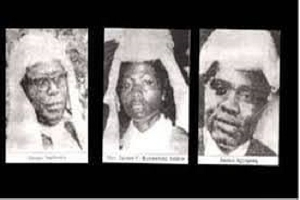By Moses Mozart Dzawu & Ekow Dontoh
Ghana’s cedi is sinking to record lows and shares of state-run companies are falling on prospects that Ghana’s Supreme Court will cancel President John Dramani Mahama’s election win and put at risk an improving economy.
“If there’s going to be another election, what is going to happen to the fiscal situation?” Stuart Culverhouse, London-based chief economist at Exotix Ltd., said by phone on July 19. “I don’t think people are going to be thinking about whether there’s going to be any unrest or volatility. People are more concerned about what that means for economic stability.”
Yields on Ghana’s dollar-denominated bonds due in 2017 barely budged after scuffles among security forces and opposition protesters broke out following 54-year-old Mahama’s victory in December and the debt is outperforming emerging-market securities this year. The Supreme Court is considering a challenge by opposition leader Nana Akufo-Addo, 69, who said the vote was marred by counting abnormalities. Testimony in the three-month trial ended on July 17 and lawyers have until July 30 to submit last arguments.
The cedi fell to a record low on July 19 and is Africa’s worst performer against the dollar this month after Kenya’s shilling. Three of the biggest decliners on the Ghana Stock Exchange Composite Index (GGSECI) this month have the government among their top two shareholders.
The Finance Ministry forecasts Ghana’s budget deficit, which ballooned last year to about triple the level of the year before, will narrow in 2013 and the $41 billion economy will expand 8 percent from 7.9 percent growth in 2012. Output shrank a quarterly 3.1 percent in the first three months of the year from a 2.1 percent expansion in the fourth quarter of 2012.
Stockpile Dollars
The cedi gained 0.5 percent to 2.055 per dollar by 2:24 p.m. yesterday in Accra, paring its depreciation this year to 7.3 percent. The currency may drop to between 2.1 per dollar and 2.2 per dollar in the next six months as investors and companies continue to stockpile dollars, Kofi Pianim, a bond trader at the Ghanaian unit of Standard Bank Group Ltd., said by phone on July 17.
“Importers are buying dollars ahead of time and investors are also holding on to dollars as a precautionary measure,” he said. “It’s driving the cedi weaker.”
Deputy Finance Minister Cassiel Ato Forson declined to comment on the effect of the court case on the currency in an interview on July 19.
Deficit Widened
As post-election protests broke out, yields on Ghana’s $750 million Eurobonds rose one basis point, or 0.01 percentage point, to 4.96 percent on Dec. 12, a day after Akufo-Addo told a rally of supporters he would dispute the results in court. Yields on the debt due October 2017 retreated 20 basis points yesterday to 5.68 percent by 5:20 p.m. in London. The yields have climbed 80 basis points this year, compared with a 113 basis-point increase in emerging-market bonds, JPMorgan Chase & Co. data show.
“The trial inspired confidence in Ghana’s democracy, but there are concerns about how the outcome of the trial will be handled,” said Kissy Agyeman-Togobo, Accra-based analyst with Songhai Advisory LLP. “There are questions about how Ghana’s security will be managed after the court’s ruling.”
Ghana’s budget deficit jumped to 12.1 percent of gross domestic product in 2012 from 4.3 percent the previous year as the government boosted salaries for civil servants. The Finance Ministry is forecasting the gap will narrow to 9 percent this year. In the first four months of 2013, the shortfall was 3.8 percent of GDP, compared with a forecast of 3 percent, the central bank said in May.
The deficit on the nation’s current account, the broadest measure of trade in goods and services, widened to 12.3 percent of GDP last year from 9 percent in 2011, according to the Bank of Ghana. It may narrow to 11.3 percent this year, according to the Finance Ministry.
Contested Papers
South Africa’s budget deficit is forecast to narrow to 4.6 percent of GDP in the 2013-14 fiscal year, according to the Finance Ministry in the continent’s biggest economy, from 6.3 percent in the previous period, Reserve Bank figures show. The current-account gap is expected to be 6.2 percent of GDP, compared with a 6.1 percent shortfall last year.
“There is an element of nervousness,” Randy Mensah, a stock trader at Ecobank Development Corp., said by phone on July 16. “The Supreme Court decision could lead to a rerun of the December 2012 elections or a change in government.”
The court hearing, which began in April, included weeks of testimony from Akufo-Addo’s vice presidential candidate, former Bank of Ghana Deputy Governor Mahamudu Bawumia, and Kwadwo Afari-Gyan, head of the Electoral Commission, as they poured through contested papers from thousands of polling stations, with the trial broadcast daily on television and radio.
Final Hearing
The pending decision prompted investors to sell shares in companies where the government holds major stakes, Mensah said. “The heads and boards of the companies can change if the court’s ruling should lead to a change in government.”
Ghana Oil Co., which runs gasoline stations and is 51 percent owned by the government, posted the biggest decline on the Accra bourse this month, falling 31 percent. PBC Ltd., the biggest purchaser of cocoa from farmers in the country with the state and the Social Security and National Insurance Trust pension fund holding a combined 75 percent, is down 8.3 percent. SIC Insurance Co., the country’s largest insurer, retreated 7 percent. The government holds 40 percent of SIC.
Ghana Oil Managing Director Patrick Akorli didn’t answer two calls made to his mobile phone on July 19 and two calls made yesterday. SIC Chairman Max Cobbinah was in a meeting and couldn’t comment, according to a company official who answered the phone at his office on July 19. Doris Awo-Nkani, SIC’s managing director, was in a meeting, a company official who answered the phone at her office, said yesterday.
“Whichever way the decision of the court goes does not matter to PBC,” Kojo Atta-Krah, PBC’s managing director, said by phone yesterday. “PBC is a public listed company. I’ve seen government come to understand what that means.”
The court adjourned until July 31, Justice William Atuguba said during proceedings. The judges have 15 days to announce their decision after the final hearing, Sam Okudzeto, a former president of the Ghana Bar Association, said by phone.
Business News of Tuesday, 23 July 2013
Source: Bloomberg

















